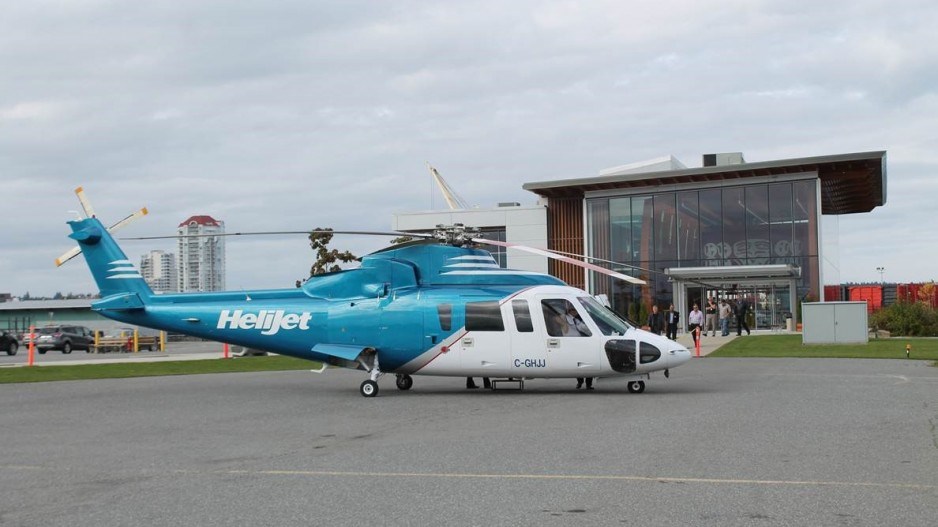British Columbians are returning to the skies as the province’s airlines resume or expand pandemic-decreased services – albeit with restrictions in place for crews and passengers.
And that’s going to mean passengers will be masked and/or gloved, spaced further apart than normal in smaller aircraft and perhaps made to submit to health checks or sign health declarations.
It also means greater attention to detail on planes as staff work to ensure thorough cleaning between flights or at the end of flying days. Of course, changes seen in other businesses such as the need for masks, use of hand sanitizer and plexiglass screening are the norm.
Helijet has halved the number of passengers aboard to six while Pacific Coastal Airlines has cut use of the centre seat at the rear of its Beechcraft 1900 19-seat planes.
And, Harbour Air has been using its larger 14-seat Twin Otter planes for service with seating cut by 40%.
Helijet vice-president Rick Hill said the company had made extensive service reductions on Victoria and Nanaimo routes but will start increasing schedules June 8 in time for the return of the B.C. legislature June 22.
Helijet’s scheduled flights between Vancouver and Victoria will increase to five round trips each weekday, up from the current three daily round trips. Flights between Vancouver and Nanaimo will double to four round-trip flights per weekday.
Hill said the company is taking things slowly and cautiously.
“It’s really very much day by day,” he said. “We’re tracking reservation calls and trying to understand what this new normal looks like.”
He said the company would normally be at the end of its business season and moving into the tourism period. But, with cruise ships not coming, “that’s not happening.”
To meet service demands, Harbour Air has reduced onboard seating for distancing and asks passenger to sign a health declaration form before travel. Passengers may also be asked to submit to temperature checks with no-touch thermometer.
Also, ground and flight crews have their temperature checked upon arrival at and departing from work.
Carriers are asking people to wash their hands regularly, cough or sneeze into elbows, avoid contact with anyone likely to be sick and to stay home if ill. Also, they ask for non-medical masks or face coverings to be worn when social distancing isn’t possible.
Airports, too, are asking passengers to take precautions. The same requirements for aircraft also apply in terminals.
And, said Vancouver International Airport’s (VYR) spokesman Chris Devauld, “We have been asking that only essential travellers or airport workers come to the airport. If someone is picking up or dropping off passengers, we ask that they stay outside the terminal wherever possible.”
Out at YVR’s south terminal, Pacific Coastal Airlines president Quentin Smith said the company managed to keep some parts of operations flying but began to return to more scheduled flights June 1 with very limited services.”
“It’ll take a while,” Smith said of the need to overcome people’s fears of being on small planes and to build awareness that airlines are moving again.
“The message is still, ‘Stay at home and don’t travel if you don’t need to.’” Smith said. “It’s going to be a long game to get any substantial activity.”
Smith said he’s dealt with running the company through tough economic times but having to navigate a pandemic “is completely different.”
In addition to other precautions, Pacific Coastal has gone as far as to suspend its in-flight magazine to reduce unnecessary contact. Passengers are being provided with sanitizer wipes for use on any aircraft surface and also being encouraged to check in electronically to obtain an electronic boarding pass.
The province’s airlines don't just move general passengers; they remain part of B.C.’s supply chain network and movement of essential workers.
“We have seen the impact COVID-19 has had on the communities we service,” Harbour Air vice-president Chad Wetsch said. “We didn't want to leave anyone stranded, so we responded quickly, changing how we operate to get people and supplies where they needed to go.”
Harbour Air has introduced protocols to help prepare its business for new realities.
“We had to look at every aspect of our business with a new lens, from the time people booked, to the onboard experience and then getting them where they need to go on the other end,” Wetsch said. “We did come across some roadblocks along the way in accessing supplies like masks and Plexiglas and ensuring staff could retain benefits. It took our entire team working around the clock to come up with innovative solutions on how to ensure health and safety of everyone while getting people where they need to go.”




